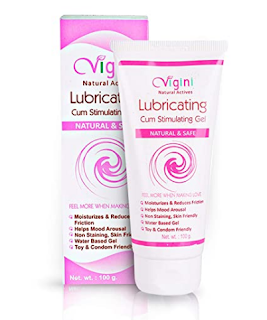Vaginal dryness is a common symptom during and after menopause, but it can happen at any age and for various reasons.
Low estrogen levels cause vaginal dryness. Estrogen hormone keeps the lining of the vagina lubricated, thick and elastic.
Vaginal dryness is a common problem, many people avoid seeking help as they do not realize that this is a health issue.
Causes
Vaginal dryness is frequently caused by a reduction in estrogen levels. As menopause approaches, estrogen levels begin to fall.
Estrogen is produced by the ovaries, and estrogen regulates the development of feminine physical characteristics such as breasts and body shape. It is also important in the menstrual cycle and pregnancy.
Estrogen aids in the thickening, moisturizing, and health of the vaginal tissues. As levels fall, the lining thins, becomes drier, and loses elasticity. These alterations are referred to as vaginal atrophy.
Estrogen levels can drop for a variety of reasons, including:
- menopause
- ovaries surgically removed (which can trigger menopause)
- breastfeeding and childbirth.
- Chemotherapy and radiation therapy are two cancer treatments.
- Anti-estrogen medications used to treat breast cancer or endometriosis.
Other causes
The other causes of vaginal dryness can include:
Using antihistamines, which aid in the management of cold and allergy symptoms by drying secretions. Vaginal dryness and difficulty peeing are possible side effects
Antidepressants, which can cause vaginal dryness, decreased libido, and difficulties having an orgasm.
Stress and worry can have an impact on libido and vaginal lubrication.
Blood flow to the vagina is reduced.
Female smokers may experience menopause earlier than nonsmokers, and thus vaginal dryness may start at a younger age.
Symptoms
People who have vaginal atrophy and dryness may encounter
Pain during intercourse
discomfort during physical exercise
and an increased risk of vaginal and urinary tract infections
If the dryness is caused by a drop in estrogen levels, they may also experience:
- Natural vaginal secretions are at a lesser level
- a narrowing of the vaginal opening a tightness of the vaginal opening
- These changes are referred to together as dyspareunia. They can cause discomfort during penetrative intercourse.
How to diagnose Vaginal Dryness
Vaginal dryness is a major health problem that affects many women. A doctor can recommend treatment to alleviate the discomfort.
People should seek medical attention if they experience any of the following symptoms or signs of a change in their vaginal health:
burning
itching\dryness
Irritation from intercourse discomfort
Pain during sex
The doctor will almost certainly:
- Inquire about any vaginal or other symptoms.
- inquire about menstruation changes
- In some situations, a pelvic examination may be performed, as well as a swab for a lab test.
There is no single test that can distinguish between vaginal atrophy and vaginal dryness. A doctor's diagnosis is usually based on the symptoms.
It may feel so uncomfortable and embarrassing to discuss such personal details, but doctors are used to having these types of conversations. Seeking assistance is the first step toward recovery.
Treatment:
Many treatment options are available for vaginal dryness. Some are available over-the-counter, while others need a prescription.
Topical estrogen therapy, a medication in the form of a cream or ointment that can be applied directly to the vaginal area to relieve symptoms, is one option.
Complete Natural Remedy For Vaginal Dryness (Kindle Edition)
When compared to taking estrogen as a pill, a person using a topical cream absorbs less estrogen. As a result, the danger of harmful effects is minimal.
Topical estrogen therapy include the following:
The vaginal ring (Estring). The individual puts a flexible ring into the vagina, where it continuously delivers low levels of estrogen into the tissues. The ring should be replaced every 90 days.
Vasodilating cream (Estrace, Premarin). The cream can be applied to the vagina using an applicator. Estrogen cream is an effective and well-tolerated treatment for vaginal atrophy and dryness, according to researchTrusted Source.
Tablet for vaginal use (Vagifem). The individual will insert a pill into the vagina using an applicator.
There is no sufficient research into the long-term effects of topical estrogen, but it is believed to be safe compared to oral hormone replacement therapy.
Over-the-counter treatments
Over-the-counter treatments can help with vaginal dryness.
For example, the use of lubricants at the time of intercourse to increase moisture can help with vaginal dryness.
Water based lubricants may be preferable to oil-based lubricants as oil-based ones can lead to condom breakage and some irritation.
A person can also use vaginal moisturizers every 1 or 2 days to help keep up the vagina’s natural moisture. They are available to purchase online.
Home remedies
There are some lifestyle changes can help combat vaginal dryness and discomfort.
Regular sex
Regular sexual activity, whether alone or with a partner can help manage vaginal dryness for sure.
During arousal, blood flow to the vaginal tissues rises, which stimulates moisture production.
Adequate foreplay and excitement prior to sex might assist in overcoming vaginal dryness and making sex more enjoyable.
Some hygiene items should be avoided.
Many personal hygiene and body care products contain scents and colours that might irritate or dry up the vaginal area.
The vaginal cavity is self-cleaning and includes a delicate balance of beneficial bacteria. Douching or the use of fragrant soaps around the sensitive vaginal area is not necessary.
Phytoestrogen supplements
Phytoestrogens are compounds that act similarly to estrogen hormones in the body. They occur in plant-based foods like soy, nuts, seeds and tofu.
Phytoestrogens In Functional Foods(Kindle Edition)
“…the first manual that synthesizes current scientific, technical, and practical aspects involved in the production, consumption, and safety of phytoestrogens in foods. …provides insight on the major questions concerning core areas of polyphenol research. This book makes scientific data accessible to a general audience of readers…”
Click Here to Know More
Click Here to Know More
Bottom line
Vaginal dryness is a common symptom that is frequently associated with a decline in oestrogen levels, including during the onset of menopause. It is unlikely to have serious health repercussions, but it can cause discomfort.
One low-risk treatment is topical estrogen cream. Mild symptoms can be managed with over-the-counter remedies such as vaginal moisturisers and the use of lubricants during sexual activity.















0 Comments